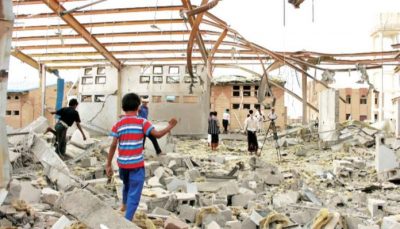Catastrophic Risk of Death for 300,000 Yemeni Children Trapped by Attack on Hodeidah

300,000 children risk death, injury and starvation as they are trapped in Yemen’s main port city which is under assault from Saudi-led Arab states, aid groups said on Wednesday.
The biggest battle in a three-year war, which has already created the world’s biggest humanitarian crisis, on Hodeidah, the main route for food and aid to reach most Yemenis, 8.4 million of whom are on the verge of famine.
Jolien Veldwijk, acting country director for the charity CARE International called the attack “catastrophic, hopeless and devastating”, worsening hunger as food will become harder to find and more expensive.
“If the port closed, even for a day, then the number of people at risk of famine will increase because no food will come into the country,” she said by phone from the capital Sanaa.
“Kids are most vulnerable so they will die first … Parents will have to make a decision of either feeding their children or treating them.”
People fled the Red Sea port city on Wednesday as Arab warplanes flew overhead.
“With this assault, (children) are now suffering more hunger and death,” Anas Shahari, a spokesman for Save the Children, told the Thomson Reuters Foundation by phone from Sanaa.
Shahari said he feared that the condition of some 300,000 children would worsen with less access to food, water and medicine, describing an already dire situation when he visited Hodeidah three months ago.
“I could see children who are hungry, children who are on the streets with their ribs sticking out, babies unable to cry because they are so malnourished,” he said. “That was the situation before, and now it is going to get worse.”
The United Nations estimates that 600,000 people live in the area, and in a worst-case scenario, a battle could cost up to 250,000 lives, as well as cutting off aid and other supplies to millions of people.
*
Featured image is from Yemen Press.

